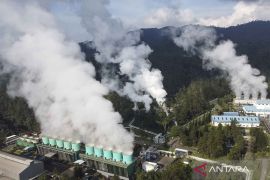Ahok said President Joko Widodo had no objections to any reclamation project as long as it did not harm the environment.Jakarta (ANTARA News) - The Jakarta Bay reclamation project has become controversial after a bribery case concerning the mega project came to light, and demonstrations against the project were staged by fishermen and the urban poor affected by it.
Calls to halt the reclamation project have been voiced by various parties, including Vice President M. Jusuf Kalla, Maritime Affairs and Fisheries Minister Susi Pudjiastuti, and Environmental Affairs and Forestry Minister Siti Nurbaya, as well as by several legislators and NGO activists.
Jakarta Governor Basuki Tjahaja Purnama (Ahok), however, has insisted that the work on the US$11.4 billion-worth project will continue as it will accommodate the interests of the public and state and will not harm the environment.
"Oh, please go ahead, if intending to stop it (the project), and a regulation should be (first) issued for it, but it should be from the president. Moreover, (the measure to) stop (the project) could be tested (challenged) in the Constitutional Court," Ahok noted in response to calls to halt the project.
Ahok said President Joko Widodo had no objections to any reclamation project as long as it did not harm the environment.
"I think, in principle, the president, who himself was a governor, sees nothing wrong with reclamation. All over the world, reclamation projects are being implemented. The president said the important aspect is that it should not damage the environment," Ahok remarked on April 15.
Ahok frequently cited Dubai and Singapore as successful examples of reclamation work, and the Jakarta Bay reclamation would make the city very advanced similar to them.
However, Minister Pudjiastuti has called on the Jakarta administration to halt the Jakarta Bay reclamation project until the developers met all necessary norms.
The reclamation was being carried out without any recommendation or observing coastal area zoning regional regulations," the minister told the press on April 15, after holding a hearing on the project with the Parliament two days earlier.
The House Commission IV and the Minister agreed to stop the project until all legal necessities are met by developers and the Jakarta authorities.
A reclamation project needs recommendation from the Maritime Affairs and Fishery Ministry.
In the meantime, Jakarta Senotor Fahira Idris has viewed that since the onset, the Jakarta Bay reclamation project has ignored the Jakarta residents right to information.
"The Jakarta residents have not received comprehensive information on the project to reclaim 17 islands for developing business centers and settlements," Fahira, deputy chairperson of Committee III of the Regional Representative Council (DPD) for Jakarta, noted recently.
Most of the information reaching the public only revealed that the reclamation was necessary and a noble deed to solve Jakartas problems of land shortage, flooding, and coastal damage, she stated.
In fact, Fahira believes that the project was more business-oriented than in tune with the publics interests.
Therefore, the Jakarta senator has urged the residents to reject the reclamation project.
"For me, the fate of the reclamation project lies in the hands of Jakartas residents. It is time for Jakartas inhabitants to demonstrate that this city does not belong to either the provincial administration or the Regional Legislative Council, and moreover, even not the property developers," Fahira emphasized.
The officials and businessmen can have the clout, authority, and money, but once the inhabitants of Jakarta stand united in rejecting the project, the reclamation work must be halted, she remarked.
The arrest of three people in connection with a bribery case concerning the reclamation project should serve as a momentum for the Jakarta public to be more alert and vocal regarding development programs in the capital city, she pointed out.
"The alleged bribery case is a tip of the reclamation iceberg. There are plenty more controversies and problems regarding the ambitious project," she noted.
Fahira quoted the Corruption Eradication Commission (KPK) as saying that the Jakarta Bay reclamation projects case was considered to be a major corruption scandal as a lot of money was on stake and several people were involved in it.
Jakarta senator also pointed out that in accordance with President Joko Widodos maritime axis vision, a coastal area, which was environmentally degraded, should be revitalized by the regional administration instead of being reclaimed, because fishermen in the coastal areas relied on it for their livelihood.
Another harsh criticism came from M Fuad Nasar, an Islamic philanthropist, who said that modernization of Jakarta should not dehumanize and evict the poor people by force.
A dream to make Jakarta another Singapore through coastal area reclamation projects should not make the Indonesian people feel as if they were outsiders in their own country.
The authorities do not make comprehensive studies on the impacts of the reclamation project on the loss of jobs of those evicted and on the environment, particularly maritime ecology, he noted.
"Modernization should not cause effects of dehumanization and forced evictions of the poor," he said.
"Evictions in slum areas will not automatically alleviate poverty, in fact it widens poverty and the social gap. This should be given serious attention in implementing development in the capital city in the future," Fuad Nasar, consultant at the Fatwa Center, said.
He referred to the forced eviction of residents of Luar Batang and Pasar Ikan, North Jakarta, with some of the residents being moved to other areas and accommodated in low-cost apartments.
Previously, residents of Jatinegara in East Jakarta and Kalijodo in North Jakarta had also been evicted for violating the Jakarta administrations land special regulations.
Thousands of security officers were deployed to guard the evictions which were resisted by some affected residents.
"There were poor people being confronted, including old people, women and children. We are moved to see such an incident. Is there no other way, which is more civilized? Did the Jakarta government lose its mind that it took such repressive means and (evictions) by force?" he said.
"Has our local wisdom to prioritize consultation and a human approach towards our own people gone?" he said.
"It is not wrong if some people question, is Pancasila still being uphold as an ethical and moral foundation in development implementation," Nasar, a magister of the National Resilience Study Program of the Gajah Mada University (UGM), said recently.
Evictions by force will unintentionally trigger radicalization in the community, he believed.
"Children witnessed their homes being destroyed by heavy equipment, their parents screamed. There were many soldiers and policemen. What do you think they have in their minds?" he added.
Such treatment towards the grassroots people would make them lost their trust in Pancasila, he said.
The capital citys development progress would not receive God Blessing because there are too many cries and teardrops of the evicted people, he remarked.
In the meantime, the Indonesian Environmental Forum (Walhi) stated that the arrest of a Jakarta lawmaker over alleged bribery in the Jakarta Bay reclamation project should serve as a momentum to totally halt the reclamation project.
"Reclamation is not in the interest of the Jakarta public but would benefit a group of elites and capitalists at the expense of nature and will affect the traditional fishermen," Walhi Jakarta Executive Director Puput T.D. Putra noted in a statement recently.
Furthermore, Jakarta historian JJ Rizal told TVOne that the recent forced evictions of North Jakarta�s Luar Batang residents, mostly traditional fishermen, by the Jakarta Administration, is not in the interest of the lower-income people, but of major developers seeking to expand the land in connection with the Jakarta Bay reclamation.
The Indonesian Traditional Fishermen Association (KNTI) said reclamation of 17 islands in the Jakarta Bay has cut the income of local fishermen by about 40 to 50 percent.
"Obviously, it has had a big impact on the economy of traditional fishermen as their income has come down by 40 to 50 percent," KNTI chief patron Chalid Muhammad said recently.(*)
Reporter: Fardah
Editor: Heru Purwanto
Copyright © ANTARA 2016











